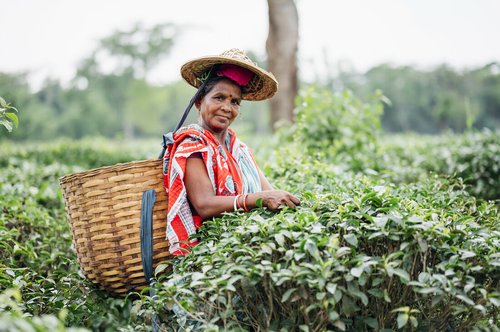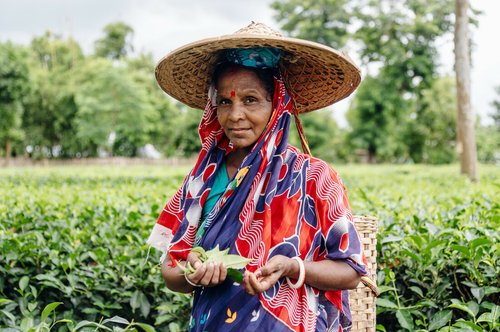What does it look like to flourish?
In the tea gardens of Sylhet, in north-eastern Bangladesh, the air is fresh and fragrant, the foliage vibrant. Just a few hours’ drive from the bustling capital city of Dhaka, it is tranquil. But there is a darker story here. While the tea gardens of Sylhet bloom, leprosy is having a devastating impact on those who live and work there – men, women and even children too.
The highest rates of leprosy in the world
Around 600,000 people live or work in Sylhet’s tea estates, and nearly every family is affected by leprosy. The tea gardens have the highest rates of leprosy our teams have ever seen, with cases between 20 and 30 times the global average.
Years of leprosy being neglected across Bangladesh has left the disease to spread unchecked. Leprosy is a disease of poverty - it thrives in areas where there is overcrowding, malnutrition, poor sanitation, and flooding. These are the conditions in which most tea workers and their families live. Climate change will only continue to exacerbate these conditions.
Ending leprosy in the tea gardens is not just vital therefore for ensuring the people living and working in the tea estates can fully thrive. It is also an important step in preventing the disease spreading across Bangladesh.
Aloka’s story
Aloka has worked as a tea picker since she was a teenager. It’s hard work, and the hours are long. It’s a lengthy walk from her home to the tea garden, and the route is often flooded. Like many families on the tea estates, Aloka’s family live in housing provided by her employers. It’s a small hut with a corrugated iron roof, but Aloka enjoys coming home to her family each evening.
A few years ago, Aloka noticed that a patch of skin on her hand was discoloured. Her family’s main breadwinner, she continued to pick tea leaves as swiftly as possible. But over time Aloka started to lose the strength in her hand. Her fingers began to stiffen, and she could no longer grip anything.

A Leprosy Mission health worker who was visiting the estate recognised Aloka’s skin patch and stiff fingers as symptoms of leprosy. Aloka took Multidrug therapy, to cure her leprosy, but it came too late to prevent the damage to her left hand. She’s lost all feeling in it.
Now, Aloka can only pick tea leaves with her right hand. As she is paid per kilogram of leaves picked her income has plummeted, impacting her whole family. Aloka is fortunate in a way – if she had not got treatment when she did, she would have lost all feeling in both hands. This could have led to her losing not only lost her job, but her home as well. If Aloka and her family had been evicted from the tea estate, they would have lost everything.
“I’m so thankful that I was found and given the medicine I needed.” Aloka told us. “But I’m sad that I was cured too late. I need help to make my hand work again. I want to look after my family and I can’t pick enough tea now to bring home a decent wage”.
Despite the challenges she faces, Aloka does all she can to remain positive. She runs a self-help group for others affected by leprosy, where they check for cuts on numb limbs to prevent infections and disability. They also run a savings group to encourage financial independence. Group members save money together and then give loans to each other when needed, enabling them to pay larger expenses and even start their own businesses. Aloka says: “I want there to be no more leprosy in the tea gardens”.
No more leprosy in the tea gardens
Our teams are discovering more cases of leprosy in the tea gardens than anywhere else, and we have made huge strides in finding and treating people affected by leprosy here. But we need to upscale our work to stop leprosy spreading to more families. There are many people like Aloka who urgently need medical care. There are many more people affected by leprosy that we do not know about yet.

We believe that every person deserves life in all its fullness. We can’t stop until, together, we see flourishing health, flourishing communities, and flourishing lives throughout Bangladesh. In 2023, as World Leprosy Day approaches, you can join us and help diagnose and cure leprosy, prevent disability, protect livelihoods, and stop the spread of this disease.
Today you can play your part in uprooting the weed of leprosy in the tea gardens, once and for all. Whether that’s by giving a gift or holding a Leprosy Sunday at your church, you can ensure that every person affected by leprosy is found. Like Aloka, they can then continue to look after their families, earn a wage, and be part of a community. Then, they can truly flourish.